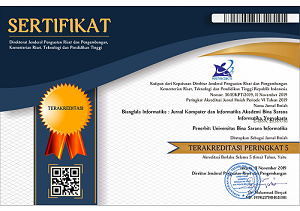Implementasi Analisis Sentimen Opini Publik Mengenai Sirkuit Internasional Mandalika Pada Twitter Menggunakan Metode Multinomial Naïve Bayes Classifier
Abstract
Abstrak - Analisis sentimen sangat berguna untuk mengetahui sentimen opini mengenai suatu topik. Hasil analisis dapat digunakan oleh para pemangku kepentingan dalam melakukan pengambilan keputusan ataupun melihat respon publik terhadap suatu kebijakan. Namun demikian, analisis sentimen yang dilakukan secara manual tentunya memerlukan waktu dan sumber daya yang tidak sedikit. Penelitian ini bertujuan untuk membangun sebuah sistem yang mampu melakukan analisis sentimen opini publik mengenai Sirkuit Internasional Mandalika menggunakan metode Multinomial Naïve Bayes Classifier secara otomatis melalui media sosial twitter. Metode ini cocok digunakan pada kasus analisis sentimen yang pada umumnya memegang asumsi independensi pada feature-nya dan cocok digunakan pada sistem real time karena waktu prediksi dan training-nya yang cepat. Dataset yang digunakan pada penelitian ini berjumlah 6184 data tweet mentah yang dibagi menjadi data training dan data testing. Berdasarkan hasil penelitian, model dengan kinerja terbaik didapatkan pada pembagian dataset 90%:10% dan kelas dataset yang diseimbangkan dengan nilai accuracy 78%, precision pada kelas positif 84% dan pada kelas negatif 73%, recall pada kelas positif 70% sedangkan pada kelas negatif 86%, dan nilai F1-Score pada kelas positif 76% sedangkan pada kelas negatif 79%. Adapun hasil analisis sentimen pada data tanggal 18 Juni – 28 Juni 2022 adalah 56% tweet memiliki sentimen negatif dan 46% tweet memiliki sentimen positif.
Kata Kunci : Analisis Sentimen, Mandalika, Multinomial Naïve Bayes Classifier, MotoGP, Twitter
Abstract - Sentiment analysis is very useful to find out the sentiment of opinion about a topic. The results of the analysis can be used by stakeholders in making decisions or seeing the public's response to a policy. However, sentimen analysis that conducted manually can need more time and resources. This study aims to build a system capable of analyzing public opinion sentiment regarding the Mandalika International Circuit using the Multinomial Naïve Bayes Classifier method automatically through social media twitter. This method is suitable for use in the case of sentiment analysis which generally holds the assumption of independence in its features and is suitable for use in real time systems because of its fast prediction and training time. The dataset used in this study amounted to 6184 raw tweet data which was divided into training data and testing data. Based on the results of the study, the model with the best performance was obtained in the distribution of the dataset of 90%:10% and the balanced dataset class with an accuracy value of 78%, precision in the positive class 84% and in the negative class 73%, recall in the positive class 70% while the negative 86%, and the F1-Score value in the positive class is 76% while the negative class is 79%. The results of sentiment analysis on data from June 18 to June 28 2022 are 56% of tweets have negative sentiments and 46% of tweets have positive sentiments.
Keywords: Sentiment Analysis, Mandalika, Multinomial Naïve Bayes Classifier, MotoGP, TwitterFull Text:
PDFReferences
Ardhiansyah, M. N., Umar, R., & Sunardi. (2019). Analisis Sentimen pada Twitter Menggunakan Metode Support Vector Machine. Seminar Nasional Teknologi Fakultas Teknik Universitas Krisnadwipayana, 1(1), 739–742. https://jurnal.teknikunkris.ac.id/index.php/semnastek2019/article/view/343/342
Data Reportal. (2022). Digital 2022: Indonesia — DataReportal – Global Digital Insights. https://datareportal.com/reports/digital-2022-indonesia
Gunawan, B., Pratiwi, H. S., & Pratama, E. E. (2018). Sistem Analisis Sentimen pada Ulasan Produk Menggunakan Metode Naive Bayes. Jurnal Edukasi Dan Penelitian Informatika (JEPIN), 4(2), 113. https://doi.org/10.26418/jp.v4i2.27526
Liu, B. (2018). Sentiment Analysis and Opinion Mining. In http://dx.doi.org/ 10.2200/S00416ED1V01Y201204HLT016 (Vol. 5, Issue 1). Morgan & Claypool Publishers. https://doi.org/10.2200/S00416ED1V01Y201204HLT016
MGPA. (2022). Mandalika. https://themandalikagp.com/about
Nugroho, A. (2018). Analisis Sentimen Pada Media Sosial Twitter Menggunakan Naive Bayes Classifier Dengan Ekstrasi Fitur N-Gram. J-SAKTI (Jurnal Sains Komputer Dan Informatika), 2(2), 200. https://doi.org/10.30645/j-sakti.v2i2.83
Pamungkas, D. S., & Setiyanto, N. A. (2017). Analisis Sentiment Pada Sosial Media Twitter Menggunakan Naive Bayes Classifier Terhadap Kata Kunci “Kurikulum 2013.” Techno.COM.
Patil, T. R., & Sherekar, M. S. S. (2018). Performance Analysis of Naive Bayes and J48 Classification Algorithm for Data Classification. International Journal Of Computer Science And Applications, 6(2). http://www.cs.bme.hu/~kiskat/adatb/bank-data-
Pintoko, B. M., & L., K. M. (2018). Analisis Sentimen Jasa Transportasi Online pada Twitter Menggunakan Metode Naive Bayes Classifier. E-Proceeding of Engineering, 5(3), 8121–8130.
Pozzi, F. A., Fersini, E., Messina, E., & Liu, B. (2017). Sentiment Analysis in Social Networks. In Sentiment Analysis in Social Networks.
Rasool, A., Tao, R., Marjan, K., & Naveed, T. (2019). Twitter Sentiment Analysis: A Case Study for Apparel Brands. 22015. https://doi.org/10.1088/1742-6596/1176/2/022015
Salim, S. S., & Mayary, J. (2020). Analisis Sentimen Pengguna Twitter Terhadap Dompet Elektronik Dengan Metode Lexicon Based Dan K – Nearest Neighbor. Jurnal Ilmiah Informatika Komputer, 25(1), 1–17. https://doi.org/10.35760/ik.2020.v25i1.2411
Statista. (2022). • APAC: active social media users by country 2022. https://www.statista.com/statistics/295606/social-media-mau-asia-pacific-countries/
Wibawa, A. P. (2018). Perbandingan Kinerja Metode Naive Bayes dan K-Nearest Neighbor untuk Klasifikasi Artikel Berbahasa indonesia. https://doi.org/10.25126/jtiik.201854773
DOI: https://doi.org/10.31294/bi.v10i2.13544
DOI (PDF): https://doi.org/10.31294/bi.v10i2.13544.g5698
ISSN: 2338-9761










